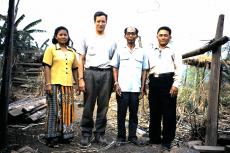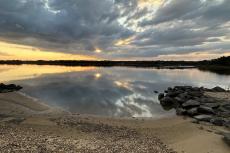Changehampton, which describes itself as a group of alarmed East Hampton residents who “can no longer stand idle while global warming, climate change, and species collapse are escalating around us,” took its message to the town trustees on Monday.
The group, which is behind the budding pollinator garden on the Town Hall campus, where the trustees hold their meetings, called on the trustees to convey their knowledge and experience in environmental work to the public “in ways that lead to action,” Gail Pellett of the group said.
“We like to say we are reimagining landscapes and changing minds,” she said, taking the town board’s 2021 climate emergency declaration “as our guiding principle.” The group advocates the restoration of disturbed landscapes, particularly lawns.
Landscaping practices create ecological deserts as well as toxic runoff, Ms. Pellett said. Turf lawns rob insects of vital habitat, and the fertilizers and pesticides applied to them poison birds, insects, and water systems, she said. “We need to transform practices to regenerate sustainable habitat for those very species and aquatic life.”
“Stop using pesticides and chemical fertilizers” is a message on Changehampton’s website. “Encourage clover lawns and dedicate a major portion of yards to pollinating gardens to encourage the return of birds, butterflies, bees, and insects.” The group promotes a “pollinator pathway movement,” the goal of which is to create the same connections between fractured habitats for pollinating species that larger land animals require to survive and thrive.
Changehampton and the trustees have common concerns and goals “that would be more effectively addressed with a partnership,” Ms. Pellett said, such as an education campaign about the relationship between lawn practices and healthy waterways. The trustees should prioritize the planting of native plants at the end of roads leading to bays and ponds, she said, and the restoration of town lawns to native and pollinating gardens.
One opportunity to put the latter recommendation into practice “sits right in front of your offices on Bluff Road,” she said, referring to the grounds of the Lamb Building in Amagansett.
Stephen Van Dam of the group, who lives on Three Mile Harbor and said that he swims in it daily, spoke of the beauty of his own recently planted pollinator garden. “It’s just a rethinking,” he said of his property. Given the trustees’ reputation and history, a media campaign “would go a long way to help bring about real change and action.”
The trustees agreed with the group’s mission, and some voiced support for a pollinator garden at the Lamb Building.
But that location may not be a good fit, said Jim Grimes, as “we use that property for events.” The trustees’ largest clam contest, held every fall, is typically attended by several hundred people and hosts a raw bar, displays by groups including the town’s shellfish hatchery, and, last year, a bandstand and one of the trustees’ pumpout boats.



